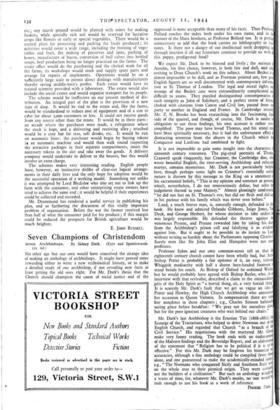Seven Champions of Christendom
No other age but our own would have conceived the strange idea of making an anthology of archbishops. It might have proved more rewarding either to write a new ecclesiastical history, or to make a detailed study of one archbishop, if not revealing new facts at least getting the old ones right. For Mr. Dark's thesis that the Church should champion the cause of social justice and of the oppressed is more acceptable than many of his facts. Thus Profess Pollard reaches the index both under his own name, and in dt manner of the Marx brothers, as Professor Bollard too. It is perh unnecessary to add that the book carries no bibliography or foal. notes. Is there not a danger of our intellectual teeth dropping through inaction if all our historians continue to provide us with d this pappy, predigested food?
We expect Mr. Dark to be biassed and lively ; the account d Anselm, his first choice, however, is both fair and dull, and addi nothing to Dean Church's work on this subject. About Becket it almost impossible to be dull, and as Freeman pointed out, few gm English figures are so well documented with contemporary inform. tion as St. Thomas of London. The legal and moral rights and wrongs of the Becket case were extraordinarily complicated and difficult to assess. They puzzled distinguished contemporaries d such integrity as John of Salisbury, and a perfect storm of lette choked with citations from Canon and Civil law, passed from party to another in England and France. In dambridge recent!! Mr. Z. N. Brooke has been researching into the fascinating legi side of the quarrel, and though, of course, Mr. Dark is under no obligation to use these findings, his own account is rather over- simplified. The poor may have loved Thomas, and his stand mu have lien spiritually necessary, but it had the unfortunate effect c( distracting attention from the abuses in the Church which Conqueror and Lanfranc had combined to fight.
It is not impossible to gain some insight into the characters :I sixteenth century statesmen. The pig-eyed portraits of Thalia Cranwell speak eloquently, but Crammer, the Cambridge don, who wrote beautiful English, the time-serving Archbishop and reluctax martyr, remains mysterious. Mr. 'Dark is not particularly helpia here, though perhaps some light on Cranmer's essentially servilo nature is thrown by this message to the King on a statement ti his sacramental beliefs, "This is my opinion and sentence at present which, nevertheless, I do not temerariously define, but refer it judgement thereof to your Majesty." Almost gloatingly conformil "he did not fast on St. Thomas's eve, but did eat flesh and did s in his parlour with his family which was never seen before."
Laud, a much braver man is, naturally enough, defended in tha book. He knew and admired Orlando Gibbons, Inigo Jones, V Dyck, and George Herbert, for whose decision to take orders was largely responsible. He defended the theatre against venomous Pryrme and Prynne rewarded him by taking his cl. from the Archbishop's prison . cell and falsifying it as evide against him. But it ought to be possible to do justice to La without writing so harshly about the Parliaments opposing Charles Surely men like Sir John Eliot and Hampden were not profiteers.
Professor Sykes and our own common-sense tell us that eighteenth century church cannot have been wholly .bad, but Ar bishop Potter is probably a fair epitome of it, an easy, tolet Whiggish mediocrity with half a dozen bare-headed footmen stand beside his coach. As Bishop of Oxford he ordained Wesle! but he would probably have agreed with Bishop Butler, who, in interview with that revivalist, described a claim to the extraordin gifts of the Holy Spirit as "a horrid thing, sir, a very horrid thing- It is scarcely Mr. Dark's fault that we get so vague an idea Potter and Howley, the High Church Archbishop who annou her accession to Queen Victoria. In compensation there are s fine anedotes in these chapters • e.g., Charles Simson habitu sating grace before breakfast: "We pray not for ourselves alone! but for the poor ignorant creatures who wait behind our chairs."
Mr. Dark's last Archbishop is the Erastian Tait (1868-1884, Scourge of the Tractarians, who helped to drive Newman out of English Church, and regarded that Church "as a branch of Civil Service." His negotiations with the martyred Mr. Gt make very funny reading. The book ends with an endorsem of the Malvern findings and the Beveridge Report, and an elaboid of the statement that "Religion has to be political if it is to effective." For this Mr. Dark may be forgiven his historical accuracies' although a fine anthology could be compiled from thcle alone, and one guaranteed to make the academically-minded ilor; e.g., "The Normans who conquered Sicily and Southern Italy so' on the whole true to their piratical origin. They were certa°! not the builders of a civilisation." But such an anthology would a waste .of time, for, whatever Mr. Dark's merits, no one would rash enough to use his book as a work of reference.
PHOEBE P0°1-


























 Previous page
Previous page